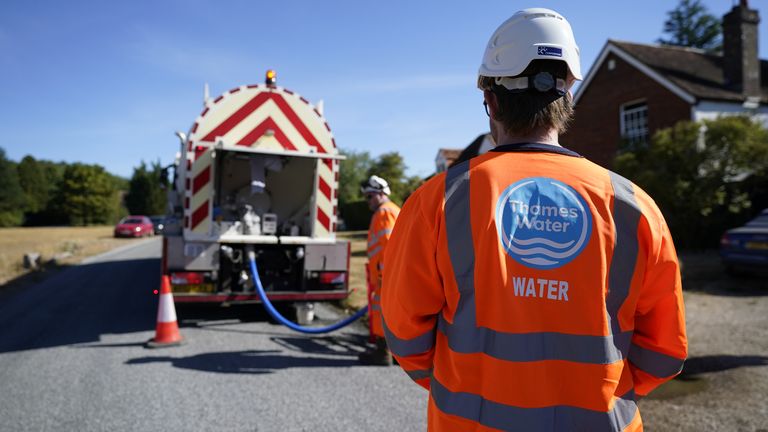Thames Water prepares debt contingency plan as it warns on cash


Crisis-hit Thames Water has warned its cash remains on track to run dry by the end of May next year due to a lack of new investment, forcing it to prepare a plan for its lenders.
The country’s biggest water company, which serves almost a quarter of the population, previously said it had £2.4bn of liquidity as of the end of March.
The company said on Tuesday that the sum had fallen to £1.8bn by the end of June.
Cash-strapped Thames Water has been struggling to secure fresh funds from existing shareholders after they withdrew promised investment of £500m amid a funding row with the industry regulator.
Money latest:
Cheapest supermarket rankings now include loyalty prices
Its annual results statement said of the struggle: “The board has concluded that although it is possible that equity will be received by 31 March 2025, this should no longer be assumed for financial covenant forecast calculation purposes.”
It added that a “remedial plan” was now required to be prepared for its lenders as it was not meeting the terms of certain compliance tests, complicating its ability to function normally in areas such as incurring debt and making payments.
The report from Thames Water, which has debts above £15bn, also showed the payment of two dividends worth £158.3m in March – raising the prospect of further penalties from Ofwat over rules governing rewards at poorly-performing suppliers.
The company said it had returned to profit over the financial year with earnings of £75m and said incidents of serious pollution fell by 18% on the previous year despite heavy rain impacting storm outflows.
Advertisement
Thames Water’s financial survival has been questioned since Sky’s City editor Mark Kleinman revealed in June last year that ministers had begun discussions on contingency plans for a possible special administration that would place the firm in temporary public ownership.
Such a move would allow everyday services to continue while its future is ironed out.
Please use Chrome browser for a more accessible video player
3:11
Thames Water under threat
Shareholders have so far refused additional funds, blaming regulator Ofwat’s framework.
The battleground is focused on industry-wide business plans for 2025-2030, which are currently under consideration.
Thames is seeking a hike of up to 44% to customer bills over the course of the next five years in return for almost £22bn of spending on improvements.
Ofwat, which is due to give its interim verdicts on company plans on Thursday, had already rejected pleas for a 40% hike to bills.
That determination prompted the withdrawal of promised investment, leaving Thames facing the prospect of having to secure new investors.
Its parent firm has already defaulted on debt interest payments.
Thames signalled that Ofwat’s final ruling on business plans in December would be crucial in determining its future.
Chief executive Chris Weston told a call with analysts that it expected to start a formal process for raising equity in the autumn that would conclude in early 2025.
Read more from Sky News:
Biden’s doctor reveals findings of ‘detailed’ neurological exam
Why the weather has been ‘terrible’

Keep up with all the latest news from the UK and around the world by following Sky News
“Special administration is a long way off”, he said.
However, the company’s demands of the regulator are likely to continue to leave a bitter taste within Ofwat.
The company, which has long been accused of prioritising shareholder awards over infrastructure investment, has been trailing performance targets covering leaks and sewage discharges over many years.
It has left Thames at the mercy of the watchdog’s fine regimes.
Sky News reported last month that Thames was facing the prospect of a more than £40m Ofwat penalty over a £37.5m payout to its owners last autumn.
The payment of the controversial dividend from Thames Water Utilities Limited, the operating business, to parent firm Kemble Water and its affiliates, is understood to have fallen foul of rules overseen by the regulator which aim to avoid rewarding shareholders during periods of poor performance.
The £158.3m sum revealed on Tuesday went to two of its struggling holding companies, Kemble Eurobond and Thames Water Limited.